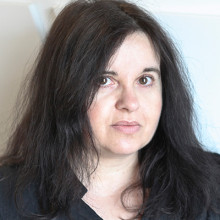Polish literature

Zyta Rudzka
Zyta Rudzka (born 1964) is a graduate of the Faculty of Psychology at the Catholic Academy in Warsaw. She is a poet, playwright and novelist with a distinctive narrative style that is highly metaphorical and structured around symbols and archetypes.
Zyta Rudzka often sets her stories in imaginary settings and explores universal themes, especially relating to encounters between men and women that transcend time and cultural differences. Her novel Uczty i głody (“Feast and Famine”, 1995) is set in several different places and time periods: Rome, ancient Egypt, and a community of Polish emigrants. Olga, the main character, participates in events set in the present day while also inhabiting a retrospective realm. The overarching motif of the book is physical desire, which can never fully be satiated.
Mykwa (“Mikveh”, 1999) tells the story of two generations of a Jewish family and the mystical love that connects two lovers who are far apart. Like in her earlier works, the setting is vague, just lightly sketched with a few lines. For Rudzka is not a realist; in fact, she has remained a poet deeply convinced that what matters most are mood, allusion and metaphor.
This can be observed in Tkanki miękkie (“Soft Tissue”, 2020). Its main characters are two doctors, a father and son—men who long for love, though they are incapable of truly imagining it. Rudzka dissects their difficult relationship, exploring what is inherited and what is variable. She describes what happens at a certain point in a person’s life when the only significant feeling that remains is the obligation to love one’s parent.
Rudzka’s most famous novel is Ten się śmieje, kto ma zęby (“Only Those With Teeth Can Smile”, 2022), which tells the story of Wera, a hairdresser who, after the death of her husband, known as the Jockey, wanders through the city with her dog in search of the things she needs for his funeral. The protagonist is a mature woman determined to live life on her own terms. This is clear when she visits her former lovers—an old corsetier named Dawid and a shop assistant named Zośka—to settle scores with both of them. Critics have commented on the novel’s bold, colloquial language, which builds surprising associations and rhythms that reveal the viscera of life, leaving the reader breathless. Rudzka received the Nike Literary Award for this novel. She has also won the Gdynia Literary Prize, the Gdynia Dramatic Prize, the Literary Award of the City of Warsaw, and the Gryfia Literary Award. Her latest book will be published this year by W.A.B.
BIBLIOGRAPHY
Poetry:
- Ruchoma rzeczywistość (“Augmented Reality”), Warsaw: Młodzieżowa Agencja Wydawnicza, 1989
Prose:
- Białe klisze (“White Film”), Katowice: Akapit, 1991, Izabelin: Świat Literacki, 1996
- Uczty i głody (“Feast and Famine”), Warsaw: Iskry, 1995
- Pałac Cezarów (“Palace of the Emperors”), Izabelin: Świat literacki, 1997
- Mykwa (“Mikveh”), Izabelin: Świat literacki, 1999
- Dziewczyny Bonda (“Bond Girls”), Warsaw: Świat Książki, 2004
- Ślicznotka doktora Josefa (“Dr. Josef’s Little Beauty”), Warsaw: Wydawnictwo Jacek Santorski & Co., 2006
- Krótka wymiana ognia (“A Brief Exchange of Fire”), Warsaw: W.A.B., 2018
- Tkanki miękkie (“Soft Tissue”), Warsaw: W.A.B., 2020
- Ten się śmieje, kto ma zęby (“Only Those With Teeth Can Smile”), 2022
Plays:
- Kursy fruwania dla ornitologów (“Flying Lessons for Ornithologists”), 2005
- Fastryga (“Basting”), 2006
- Cukier Stanik (“Sugar Bra”), 2007
- Eskimos w podróży służbowej (“Eskimo on a Business Trip”), 2008
- Pęknięta, obwiązana nitką (“Fractured, Bound with Thread”), 2010
- Zimny Bufet (“The Cold Snack Bar”), 2011
- Mamka (“The Wet-Nurse”), 2014
TRANSLATIONS
English:
Dr. Josef's Little Beauty (Ślicznotka doktora Josefa), trans. Antonia Lloyd-Jones, Seven Stories Press, 2024
German:
- Doktor Josefs Schönste (Ślicznotka doktora Josefa), trans. Esther Kinsky, Zürich: Ammann Verlag, 2009
- Mikvah (Mykwa), trans. Sven Sellmer, Berlin: Secession Verlag, 2014
Serbian:
- Kratak vatreni okršaj (Krótka wymiana ognia), trans. Milica Markić, Novi Sad: Prometej, 2023
- Smej se ako imaš zube (Ten się śmieje kto ma zęby), trans. Milica Markić, Belgrad: Službeni glasnik, 2024